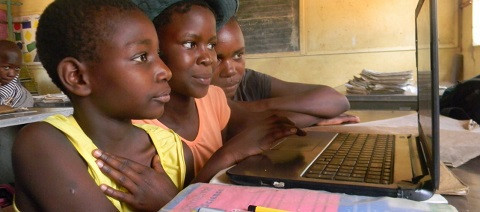
GCED Basic Search Form
Quick Search
현재 위치
뉴스

The massive learning disruption caused by the COVID-19 pandemic has revealed the weakness and unpreparedness of today’s education systems worldwide. As schools and universities shut their doors, millions of learners were suddenly excluded from education because of the flagrant digital divide. Connectivity has now become a key factor to guarantee the right to education.
Approximately half of the world’s population (some 3.6 billion people) still lack an internet connection. At least 463 million or nearly one-third of students globally cannot access remote learning, mainly due to a lack of online learning policies or lack of equipment needed to connect from home. Most students do not have the appropriate connectivity, device and digital skills required to find and use educational content dependent on technology.
At the Global Education Meeting convened by UNESCO in October 2020, governments and the international community identified five priorities for urgent action, including support to teachers as frontline workers, investment in skills and narrowing the digital divide. Scaling up digital skills and learning holds the potential to increase the reach and relevance of education systems and improve job prospects for youth in our fast-changing and digitalized economies.
This is why the United Nations is spearheading a new global initiative on digital learning and skills, targeting marginalized children and youth to close the digital divide and drive rapid change in education systems. Building on the established partnership of E9 countries, which groups Bangladesh, Brazil, China, Egypt, India, Indonesia, Mexico, Nigeria and Pakistan, the initiative gives them the opportunity to collaborate and scale progress on digital learning and skills. The initiative is supported by UNESCO, UNICEF, the Global Education Coalition and Generation Unlimited.
Focus on some of the world’s most populous countries
Representing over half the global population and some of the largest education systems in the world, the group of E9 countries can strengthen political will and collective effort to ensure quality education and accelerate progress towards SDG4. This requires a targeted approach: the E9 countries offer an initial springboard to accelerate progress on digital learning and skills in the immediate term and ultimately on the SDG4 agenda in this Decade of Action leading up to 2030. Here are some reasons why:
1. These countries are among the world’s most populous (4.1 of 7.9 billion) with large youth populations (1.6 billion by 2030) and with a high potential demographic dividend in low and low middle-income countries.
2. The education systems are among the largest in the world; representing 51.6 percent of all learners of the world at all levels. Most countries have federal, decentralized education systems for education delivery, with diverse and complex governance and finance structures.
3. They have an established history of cooperation through the E9 partnership including on ICT.
4. They have an enabling ecosystem involving governments, the private sector, youth and other key partners with potential to engage in a renewed social compact in support of digital learning, skilling and livelihoods.
5. Most learners in the nine countries still face disruption to learning either fully or partially and 11.3 million are at risk of not returning to education institutions. How these countries manage the transition phase to recovery, build resilience and reimagine education is crucial for global progress and development, along with efforts to ensure no one is left behind.
6. The success and lessons learned from high population countries will garner significant visibility and offer a blueprint for scaling progress in many countries across the world.
7. Their positions within global education and international cooperation fora, together with alignment of this initiative with the priorities of the G7 and G20, will ensure that lessons learned are cross fertilized and shared widely.
A global initiative to drive educational change
Through country-wide action plans, peer-learning and rallying a global coalition of partners, the initiative will focus on:
1. Expanding access to digital learning solutions that build a range of skills for all children and youth and ensures that teachers, parents and caregivers can offer the scaffolding that children need to learn.
2. Connecting schools, every child and every youth to the internet.
3. Providing children and youth with a range of devices (mobile, laptop, desktop) to access learning.
4. Ensuring that content and data are affordable for students, teachers and schools.
5. Investing in teacher training and scaling innovative practices to enable digital learning.
6. Addressing the barriers facing girls and young women to digital access, including social norms, online safety and privacy, skills and leadership to close the gender digital divides.
7. Investing in reskilling and up-skilling of youth to enable the school to work and life transition.
8. Engaging youth to achieve the ambition for digital learning and ensuring its relevance and protecting privacy and promoting safety.
The goal is ambitious: closing the digital divide means connecting every child and youth – some 3.5 billion by 2030 – to digital solutions that can offer personalized and relevant learning.
On 6 April 2021, UNESCO and the Government of Bangladesh will convene a consultation with the Ministers of Education of the E9 countries to highlight progress, share lessons and explore opportunities for collaboration and scale-up to expand digital learning and skills. A Marketplace segment for public-private partnership will showcase local and global solutions and opportunities for digital learning. The meeting will feature the participation of the UN Deputy Secretary-General, UNESCO, UNICEF, Generation Unlimited, the Malala Fund, the World Bank and other stakeholders including partners from the Global Education Coalition.
Related news:
- One year into COVID-19 education disruption: Where do we stand?
- Connectivity, gender and teachers: How the Global Education Coalition is supporting COVID-19 learning recovery
URL:
